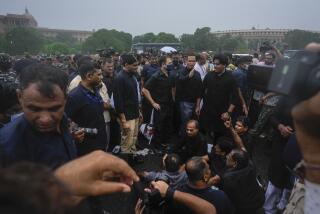TRADE : U.S. Trade Accusations Sting India : Actions Could Set Back Gandhi’s Efforts to Open Market
- Share via
NEW DELHI — By accusing India of unfair trade practices, the United States may have dealt a major setback to Prime Minister Rajiv Gandhi’s cautious efforts to open the vast Indian market to foreign goods, some government and business officials say.
The nation of 880 million people long has aspired to self-sufficiency and has thrown up a barricade of red tape to foreign investment, but the few U.S. brand names to reach consumers have achieved overnight popularity.
Wrangler jeans, CBS music cassettes and Chesterfield cigarettes are among the American brands that entered India after Gandhi’s government started easing the protectionist policies of his mother and predecessor, Indira Gandhi.
All are manufactured in India under license and in association with local partners, with the foreign share of such enterprises limited to 40%.
Contrary Reaction
The opening of Indian markets started in 1985, a few months after Rajiv Gandhi took office. But observers say last week’s citing of India under the U.S. Omnibus Trade Act could hinder the process.
“The U.S. perception seems to be that it can open up Indian markets with a crowbar,” said industrialist Hari Shankar Singhania. “From the logical point of view, it is better to use good will.”
“I doubt whether the intended results will follow--and maybe contrary reactions will set in,” he said.
Washington last week cited India, Japan and Brazil as the worst offenders in raising trade barriers to U.S. goods. India was cited for impeding direct foreign investment and closing the Indian insurance market to foreign companies.
The United States could impose tariffs of 100% on Indian goods if negotiations fail to remove the barriers within 18 months.
In an editorial entitled “A Super Folly,” the pro-government Hindustan Times said: “By branding India as an unfair trade partner at a time when the country is attempting to move towards more open trade, the U.S. runs the risk of reversing the tide of opinion building up in favor of liberalization.”
But a U.S. Embassy official, who asked not to be identified further, said, “There has definitely been some liberalization, but there is a considerable distance to go.”
Calls Action Unfair
Despite its tentative reforms, India still levies customs duties in excess of 200% on some foreign goods and industrial components.
The Indian government has yet to respond to the U.S. invitation for negotiations. Its only comments have been that the U.S. action was unfair and irrational.
“Negotiations cannot be held under threat. How can you expect any self-respecting country to do it?” said Singhania, who led a delegation to the United States earlier this month to try to ward off citing India under the trade act.
A U.S. delegation also came to New Delhi earlier in May for discussions with Indian government officials.
“We justified our restrictions because of our balance of payments constraints,” said Anwarul Hoda, a Commerce Ministry official who participated in the talks. “But even while offering justifications, we are liberalizing. Our trade has never been so liberal.”
Both Hoda and Singhania said India’s trade surplus with the United States has been declining, from $1 billion in 1987 to $700 million in 1988.
They said Washington’s tough measures were unjustified because India was responsible for less than 1% of the United States’ overall trade deficit. Japan is responsible for 44% of the U.S. trade deficit.
Partial to U.S. Brands
But neither Hoda nor Singhania denied the tremendous appeal and potential for U.S. goods and services in India.
“U.S. brands, techniques and marketing systems are the best in the world,” said Singhania, president of the J. K. Organization, which manufactures synthetic fabrics, paints and cosmetics. “We cannot afford to build an edifice on the basis of protectionist policies.”
Among consumer items, U.S.-franchised stereo cassettes hold a virtual monopoly in India’s Western music market.
“CBS cassettes sell very well,” said a salesman at a music shop in New Delhi. “Since they came in the market, Music India (the major local company) has dropped.”
More to Read
Sign up for Essential California
The most important California stories and recommendations in your inbox every morning.
You may occasionally receive promotional content from the Los Angeles Times.









